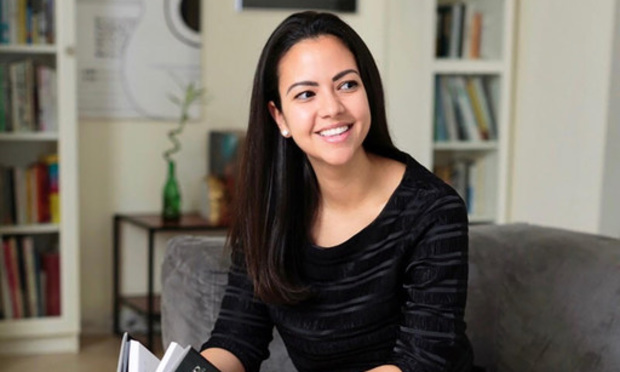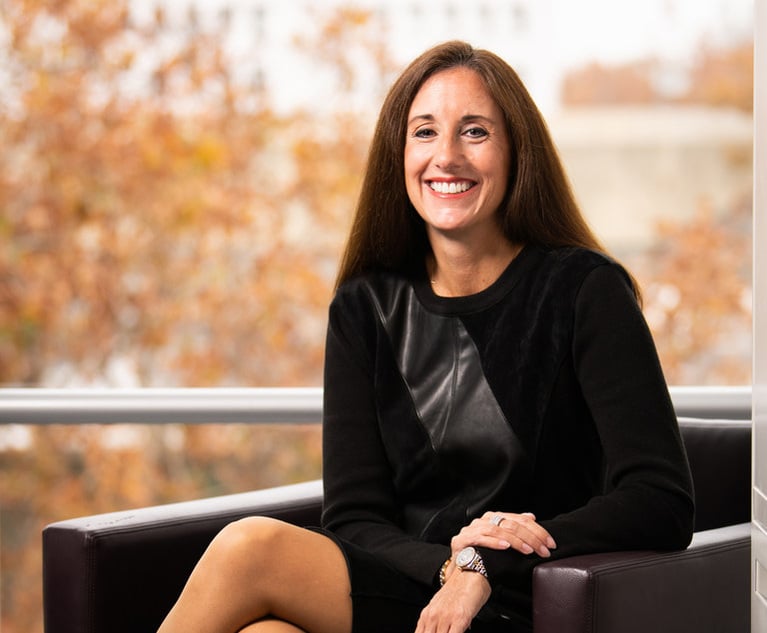Kristen Corpion Wants to Raise an Army of 'Modern Attorneys'
A Big Law refugee, Corpion has found success as a solo practitioner, and now wants to pass her knowledge on to others.
April 26, 2019 at 11:12 AM
5 minute read
 Corplaw Founder Kristen Corpion. Courtesy photo
Corplaw Founder Kristen Corpion. Courtesy photo
Kristen Corpion found Big Law stifling.
A graduate from the University of California, Berkeley School of Law, Corpion worked hard to land a coveted associate position at Greenberg Traurig while holding down two jobs. She followed all the rules and found herself following the traditional trajectory: associate, senior associate, shareholder.
But she was unhappy. Her mother built her own company; her sister did as well. Entrepreneurship and independence are values she said are essential to her career.
“I think that the creative voices are drowned out by the hierarchy,” Corpion said. ”And there's the idea that newcomers need to sit back, pay their dues and simply be grateful that they're even in the room and not question those at the top of the food chain. … We're taught to question everything in law school.”
So she left, striking out onto her own in 2017 before turning 30. She began teaching at Florida International University's Honors College. Months later, she founded CORPlaw: her solo firm that provides general counsel services to startups.
Nowadays, a typical day involves juggling responsibilities and working late into the night from wherever she chooses to work, whether it's home or a WeWork space. She said she has nothing against Greenberg or Ver Ploeg & Lumpkin (now Ver Ploeg & Marino). They just weren't for her.
It's been a journey fraught with self-doubt and anxiety. And she's never been happier.
Now, with her career stabilized, the career-manic Corpion has opened a new chapter. With much of the hard part mostly behind her, she is turning to face what she sees as systematic problems in the industry — the lack of collaboration and authentic dialogue — with the hope of helping others who feel disenchanted by the traditional attorney track.
Last year, she founded Sidebar, a collaborative, free organization that aims to connect “modern-thinking” attorneys with one another. The organization's most popular feature, with a subscription base in the thousands according to Corpion, is its weekly email newsletter stuffed with events and job openings.
“Struggling through the process — law school and building my practice — was something I don't think I'll ever forget,” she said. “Working on both: building my own practice and taking up the mantle of community building … it's something that I'm passionate about. I'm working with pre-law students and law students, and I think that generally students don't have an honest picture of what the industry will be like.”
Modern, as she explains it, isn't synonymous with young attorney or small firm. One just has to yearn for a different legal landscape, a creative approach to traditional problems. All are welcome to join, even non-attorneys. Corpion said she has a special place in her heart for what she calls “alternative J.D.s,” law graduates and attorneys who have left the industry.
While Corpion chose to launch her own solo firm, many attorneys don't. According to the latest comprehensive data on lawyer demographics, 49% of attorneys were solo practitioners in 2005, while 75% worked in firms with a head count of less than five. Although law firm consolidation has accelerated in the years since, there is no evidence pointing to the idea that the trend has measurably changed.
Solo practitioners face a slate of problems in today's legal market, including spending too much time and money on administrative tasks and bill collection. Technology, which in many ways has made practicing easier, has increased the risk of data breaches and the overhead that comes from preventing one.
And solos are not immune from the same problems that face even the largest of firms: intense rate pressure. According to a Thomson Reuters survey of solo practitioners and small firms, 87% of respondents say they face significant challenges in offering competitive pricing.
Corpion faces these issues everyday, and helping others navigate through the process and find what they love to do — whether it be her students or her peers at Sidebar — is how she passes down what she learned. While she was waffling between sticking to her Big Law track and going it alone, she was discouraged that she couldn't find anybody to model her career after. She doesn't want others to feel the same.
“I'm not at all naive to believe that an organization, company or events will completely change the legal profession overall. Looking small-scale, it's about looking to create a safe space to engage in a dialogue that's authentic and different than anything I've seen,” she said. “For me, it's about shake things up and start something new.”
Kristen Corpion
Born: 1989
Spouse: Dustin Pinkerton
Education: University of California, Berkeley, J.D., 2013; University of South Florida, B.A., 2010
Experience: Founder, Sidebar, 2018-present; Founder, CORPlaw, 2017-present; Adjunct faculty, Florida International University, 2016-present; Associate, Ver Ploeg & Lumpkin, 2015-2017; Associate, Greenberg Traurig, 2012-2015
This content has been archived. It is available through our partners, LexisNexis® and Bloomberg Law.
To view this content, please continue to their sites.
Not a Lexis Subscriber?
Subscribe Now
Not a Bloomberg Law Subscriber?
Subscribe Now
NOT FOR REPRINT
© 2025 ALM Global, LLC, All Rights Reserved. Request academic re-use from www.copyright.com. All other uses, submit a request to [email protected]. For more information visit Asset & Logo Licensing.
You Might Like
View All

EB-5 Rebounds After a Rocky Year: Challenges of 2024 Lay Groundwork for a Booming 2025

Are Counsel Ranks Getting 'Squeezed' as Nonequity and Associate Pay Grows?
5 minute readTrending Stories
Who Got The Work
J. Brugh Lower of Gibbons has entered an appearance for industrial equipment supplier Devco Corporation in a pending trademark infringement lawsuit. The suit, accusing the defendant of selling knock-off Graco products, was filed Dec. 18 in New Jersey District Court by Rivkin Radler on behalf of Graco Inc. and Graco Minnesota. The case, assigned to U.S. District Judge Zahid N. Quraishi, is 3:24-cv-11294, Graco Inc. et al v. Devco Corporation.
Who Got The Work
Rebecca Maller-Stein and Kent A. Yalowitz of Arnold & Porter Kaye Scholer have entered their appearances for Hanaco Venture Capital and its executives, Lior Prosor and David Frankel, in a pending securities lawsuit. The action, filed on Dec. 24 in New York Southern District Court by Zell, Aron & Co. on behalf of Goldeneye Advisors, accuses the defendants of negligently and fraudulently managing the plaintiff's $1 million investment. The case, assigned to U.S. District Judge Vernon S. Broderick, is 1:24-cv-09918, Goldeneye Advisors, LLC v. Hanaco Venture Capital, Ltd. et al.
Who Got The Work
Attorneys from A&O Shearman has stepped in as defense counsel for Toronto-Dominion Bank and other defendants in a pending securities class action. The suit, filed Dec. 11 in New York Southern District Court by Bleichmar Fonti & Auld, accuses the defendants of concealing the bank's 'pervasive' deficiencies in regards to its compliance with the Bank Secrecy Act and the quality of its anti-money laundering controls. The case, assigned to U.S. District Judge Arun Subramanian, is 1:24-cv-09445, Gonzalez v. The Toronto-Dominion Bank et al.
Who Got The Work
Crown Castle International, a Pennsylvania company providing shared communications infrastructure, has turned to Luke D. Wolf of Gordon Rees Scully Mansukhani to fend off a pending breach-of-contract lawsuit. The court action, filed Nov. 25 in Michigan Eastern District Court by Hooper Hathaway PC on behalf of The Town Residences LLC, accuses Crown Castle of failing to transfer approximately $30,000 in utility payments from T-Mobile in breach of a roof-top lease and assignment agreement. The case, assigned to U.S. District Judge Susan K. Declercq, is 2:24-cv-13131, The Town Residences LLC v. T-Mobile US, Inc. et al.
Who Got The Work
Wilfred P. Coronato and Daniel M. Schwartz of McCarter & English have stepped in as defense counsel to Electrolux Home Products Inc. in a pending product liability lawsuit. The court action, filed Nov. 26 in New York Eastern District Court by Poulos Lopiccolo PC and Nagel Rice LLP on behalf of David Stern, alleges that the defendant's refrigerators’ drawers and shelving repeatedly break and fall apart within months after purchase. The case, assigned to U.S. District Judge Joan M. Azrack, is 2:24-cv-08204, Stern v. Electrolux Home Products, Inc.
Featured Firms
Law Offices of Gary Martin Hays & Associates, P.C.
(470) 294-1674
Law Offices of Mark E. Salomone
(857) 444-6468
Smith & Hassler
(713) 739-1250







